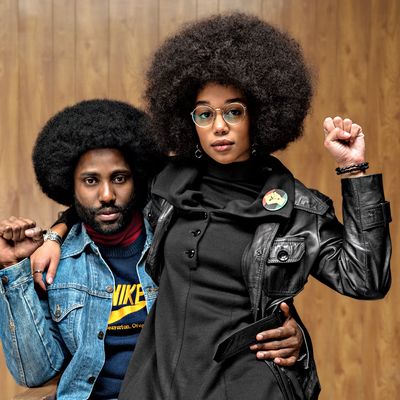
ThereÔÇÖs something important to know when you see Spike LeeÔÇÖs explosive BlacKkKlansman, which is based on the bizarre exploits of black Colorado Springs undercover detective Ron Stallworth: Since LeeÔÇÖs days as an NYU graduate film student, he has publicly stewed over D.ÔÇàW. GriffithÔÇÖs The Birth of a Nation and wanted to savage it onscreen ÔÇö which he does here, definitively. In one of BlacKkKlansmanÔÇÖs most stunning scenes, Stallworth (John David Washington) watches Ku Klux Klan initiates and their proud families at a screening of GriffithÔÇÖs film: TheyÔÇÖre repulsed on cue when shiftless blacks take over a southern legislature, enraged when a pure white virgin throws herself off a cliff rather than submit to a black man, and enraptured when the holy Klan gallops in to avenge the death, dumping the black manÔÇÖs corpse in his town as a warning. Lee himself has a propagandist streak, and he knows nothing ever sold the message of white emasculation and the existential necessity of keeping blacks down as well as GriffithÔÇÖs 1915 film. It revived the Klan and ÔÇö insult to injury ÔÇö is still reckoned a landmark of narrative filmmaking. If there were no other reason to make BlacKkKlansman, this one would be good enough.
But there are, of course, plenty of other reasons. StallworthÔÇÖs memoir is set in the late 1970s but obviously resonates in an age of resurgent white supremacy and anti-Semitism, not to mention a sympathetic U.S. president (who makes an appearance in the filmÔÇÖs 2017 Charlottesville coda). The movieÔÇÖs tone is queasy but with huge laughs at the cretinousness of Klan members, among them their national leader, David Duke (played by Topher Grace). StallworthÔÇÖs feat is engaging Klan members over the phone by fulminating about Jews and nÔÇöers, especially the one who put his ÔÇ£filthy black handsÔÇØ on his ÔÇ£purest white-driven-snowÔÇØ sister. Obviously, Stallworth canÔÇÖt show up at the actual meetings and dispatches in his place fellow undercover cop Flip Zimmerman (Adam Driver), who happens to be a Jew. A black and a Jew putting one over on the dimwitted racists! Lee wants audiences to laugh their black/Jewish/liberal asses off. As for those without black/Jewish/liberal asses, well, itÔÇÖs hard to say what theyÔÇÖll do.
Lee and co-screenwriter Kevin Willmott (along with the team of Charlie Wachtel and David Rabinowitz) have made a couple of key changes to StallworthÔÇÖs memoir. The most significant is that itÔÇÖs now a quasi-redemption story. The first black detective on the Colorado Springs police force, Stallworth lands the undercover gig by agreeing to pose as an audience member at a speech by Black Panther Stokely Carmichael, a.k.a. Kwame Ture (Corey Hawkins), whoÔÇÖs considered by law enforcement a dangerous agitator. Although Stallworth professes pride in being a cop, you see the shame in his eyes when heÔÇÖs forced to report on his own people. HeÔÇÖs also trying to make time with a black activist, Patrice Dumas (Laura Herrier with an Angela DavisÔÇôsize Afro), with no use for racist cops who shoot black people in the streets. Not all cops, he tries to say, but that doesnÔÇÖt exactly take. As Ture exhorts the crowd to ÔÇ£stop running away from being blackÔÇØ and says heÔÇÖd ÔÇ£rather see a brother kill a white racist cop than kill a Vietnamese,ÔÇØ Lee shows black faces, male and female, drift across the screen, materializing and dematerializing, drinking in these words. Stallworth isnÔÇÖt immune to them. Lee doesnÔÇÖt endorse violence ÔÇö it would be a betrayal of the real Stallworth, who in his memoir is no fan of Antifa and its ilk ÔÇö but he doesnÔÇÖt un-endorse it. Demagogues are salesmen and salesmanship excites him.
In life, there was no woman activist to turn Stallworth on and tell him off. The cop who stood in for Stallworth at Klan meetings wasnÔÇÖt Jewish and didnÔÇÖt have to worry about being inspected for circumcision. And the climax in which the wife of a Klan member carries a bomb to PatriceÔÇÖs house didnÔÇÖt happen ÔÇö itÔÇÖs Birth of a NationÔÇôstyle melodrama. Lee doesnÔÇÖt do subtlety. But the movie is very entertaining and comes with a stupendous, lushly melodic score by Terence Blanchard. StallworthÔÇÖs attempts to engage Patrice (ÔÇ£How you doinÔÇÖ this evening, my sister?ÔÇØ ÔÇ£I can dig it, I can dig itÔÇØ) are painfully funny, and his racist telephone rants ÔÇö delivered while colleagues look on, struggling not to explode ÔÇö outright howls. Jasper P├ñ├ñkk├Ânen is the Klan member whoÔÇÖs suspicious of DriverÔÇÖs ÔÇ£StallworthÔÇØ from the get-go, and with his scarily unblinking eyes, heÔÇÖs a ringer for a rural mechanic I once met (my car broke down) who explained why no one should be forced to live without a gun in a city full of nÔÇöers. GraceÔÇÖs David Duke is a callow twerp who laughs at his own racist jokes, and the performance proves the perfect setup for footage of the man himself in Charlottesville. Lee doesnÔÇÖt twist peopleÔÇÖs words. These are their words.
BlacKkKlansman would have been richer if Lee had dramatized the real StallworthÔÇÖs reservations about black militancy. But both sides, pace Trump, are not equal. Harry Belafonte plays an elderly activist who recounts for a group of black students the torture and murder by a Klan-affiliated group of a mentally disabled black man. The coda brings this goofy, upbeat story into the frightening, downbeat present. Maybe using Charlottesville footage is too easy, too much of a sucker punch, but Lee has spent his life in the shadow of The Birth of a Nation, and heÔÇÖll never discount the potency of graphic melodrama.
´╗┐*This article appears in the August 6, 2018, issue of┬áNew York Magazine. Subscribe Now!
BlacKkKlansman was nominated for six Oscars in 2019, including Best Picture, Best Director, Best Supporting Actor, Best Adapted Screenplay, Best Original Score, and Best Film Editing.


